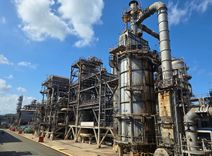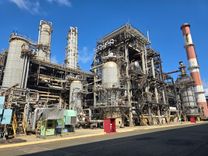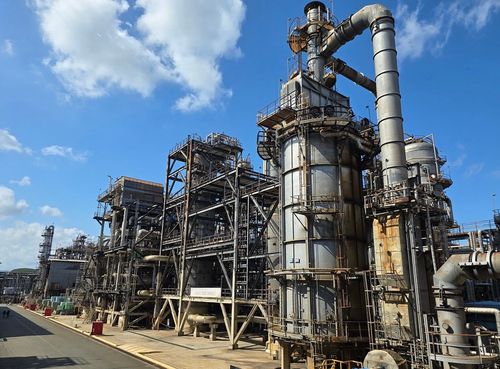SK Energy to start commercial production of SAF in South Korea



Panoramic view of SK Energy’s facility for continuous SAF production via co-processing, using bio-feedstocks delivered through newly invested dedicated tanks and pipelines. / SOURCE: SK Energy
September 12, 2024
BY SK Energy
On Sept. 11, SK Energy, the largest refiner in South Korea and a subsidiary of SK Innovation, announced the completion of the nation’s first dedicated sustainable aviation fuel (SAF) production line. The new facility, which leverages advanced co-processing technology, is set to commence commercial production next month. This marks a significant milestone in the company’s ongoing efforts to lead the rapidly expanding SAF market, a burgeoning field within the refining industry.
SAF is a type of aviation biofuel with similar chemical properties to jet fuels but a smaller carbon footprint. The co-processing method-based SAF production line integrates bio-feedstocks with traditional oil production processes, allowing simultaneous production of petroleum and low-carbon products. A dedicated five-kilometer pipeline is installed to feed bio-feedstocks continuously into the oil product manufacturing process, enabling continuous SAF production.
Once commercial production starts, SK Energy will complete a value chain encompassing raw material procurement, production, and sales for the SAF business. Last year, SK Trading International, another SK Innovation subsidiary, invested in waste-based raw material suppliers to ensure a consistent supply of bio-feedstocks. Furthermore, SK Energy is collaborating with Infinium to develop e-fuel technologies that utilize green hydrogen and carbon dioxide.
Advertisement
In June, SK Energy achieved multiple critical certifications to support SAF production and sales, including ISCC CORSIA, which officially recognizes SAF production for the international aviation sector. The company also secured ISCC EU certification under the European Union’s Renewable Energy Directive (RED) and ISCC PLUS certification for environmentally friendly products in the voluntary market.
Starting early next year, SK Energy will supply SAF to Korean Air passenger flights, a pivotal move that aligns with the company’s broader strategy for market expansion. This initiative follows a recent event on August 30 at Incheon International Airport where SK Energy, the Ministry of Trade, Industry and Energy, the Ministry of Land, Infrastructure and Transport, Incheon International Airport Corporation, and Korean Air celebrated the commercial operation of domestically produced SAF.
Advertisement
The global SAF market is poised for tremendous growth. According to the International Air Transport Association (IATA), global SAF demand is projected to increase nearly 70-fold, from 240,000 tons in 2022 to 18.35 million tons by 2030. Domestically, the Korean government plans to mandate SAF blending in all international flights departing from Korea starting in 2027.
“As the first company in Korea to achieve continuous SAF production through co-processing, we are well-prepared to meet the upcoming mandatory SAF blending requirements,” said Hong Kwang-pyo, head of strategy division at SK Energy. “We will continue to monitor both domestic and international SAF policies and market conditions closely to explore further expansion of our SAF production capabilities.”
Related Stories
Neste and FedEx, the world’s largest express cargo airline, have agreed on the supply of 8,800 metric tons (more than 3 million gallons) of blended Neste MY Sustainable Aviation Fuel to FedEx at Los Angeles International Airport (LAX).
A bill to formally adopt a revenue certainty mechanism to support the production of SAF was introduced in the U.K. Parliament on May 14. The proposed scheme is in the form of a guaranteed strike price.
Delta Air Lines on May 7 announced its strong support for new bipartisan, bicameral legislation that will accelerate the growth of sustainable aviation fuel (SAF) in Michigan. The bill aims to create a SAF tax credit of up to $2 per gallon.
The U.S. EPA on May 14 delivered two RFS rulemakings to the White House OMB, beginning the interagency review process. One rule focuses on RFS RVOs and the other focuses on a partial waiver of the 2024 cellulosic RVO.
The U.S. EPA on May 15 released data showing nearly 1.79 billion RINs were generated under the RFS in April, down from 2.09 million generated during the same month of last year. Total RIN generation for the first four months of 2025 was 7.12 billion.
Upcoming Events










